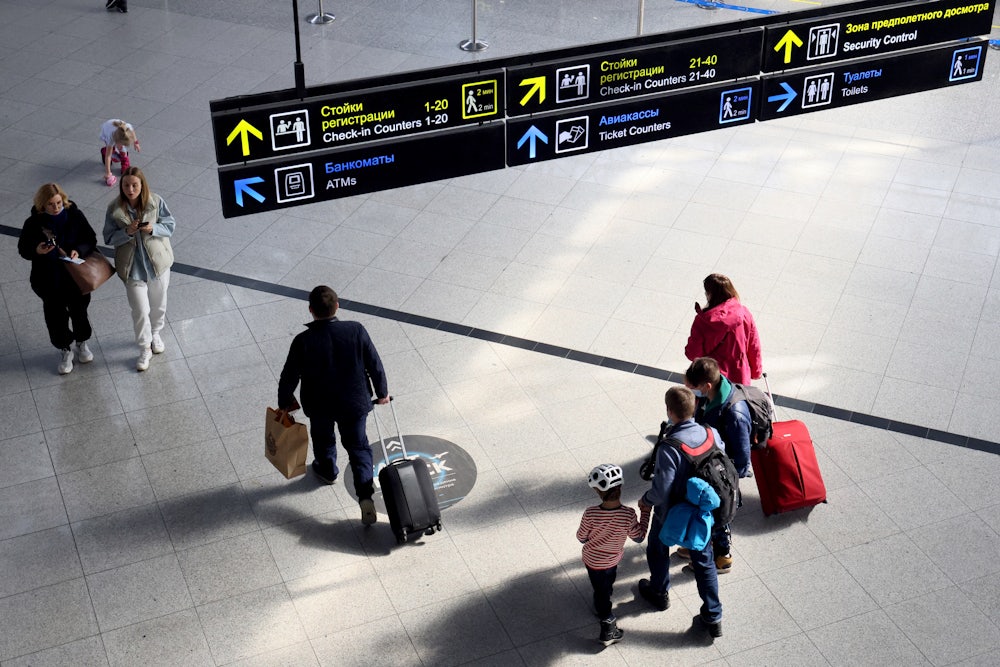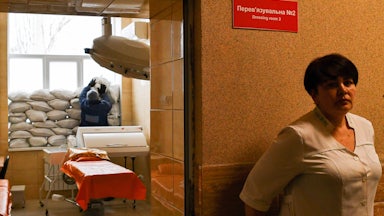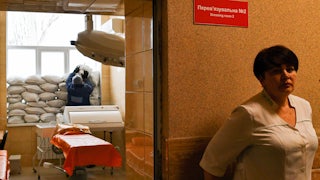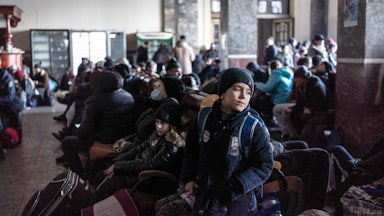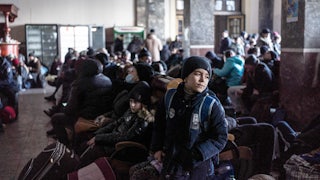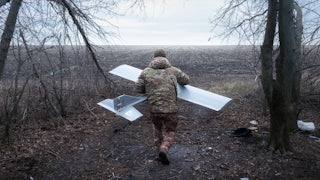I first heard the words “martial law” at about 6 p.m. on Wednesday. A journalist friend rang me up to say that Russia was seemingly on the verge of imposing emergency wartime measures; he and his Russian partner were buying plane tickets to leave. After I hung up, a quick online search revealed that—among other things—martial law would give Russian authorities the power to close the borders. Like my friend, I have a Russian partner. With my current Russian visa set to expire in a few months’ time, the two of us quickly realized that if we remained in Russia, we could very well end up on two different sides of a new “iron curtain.”
I messaged one of the best-connected people I know: a Russian analyst who, unlike the vast majority of her colleagues, correctly predicted the Russian invasion of Ukraine. When she texted back to say she hadn’t heard anything about martial law, it was a momentary relief. But she added that it would be a “logical” next step for Putin and that she couldn’t reach most of her usual sources—because they were all packing to leave.
I called a top editor at one of the few remaining independent media outlets in Russia. His reporters had spent the previous day ringing their contacts in the government, he said, in order to ask them whether martial law was imminent. Nobody knew anything. Either it was a false alarm or all the decisions were being taken by President Vladimir Putin and a tiny coterie of security officials. The editor added that he was already in Yerevan, the capital of neighboring Armenia, and all their male journalists were going to leave Russia within the next 48 hours. One of the reasons to close the borders in wartime is to keep conscription-age men inside the country.
Perhaps this was all a rumor put out by the Kremlin, or groups close to the Kremlin, to rid the country of anyone still inclined toward political opposition. Maybe it was disinformation spread by the Ukrainian side as a way to sow panic. (The only on-the-record source appeared to be a Ukrainian official.) Putin’s spokesman, Dmitry Peskov, eventually told reporters it was a hoax. But who would believe Peskov after all the denials of an imminent attack on Ukraine? Within a few hours of that first phone call from my friend, we decided the risks were too high—we had to leave. Unlike many others, we were lucky enough to have the option of taking such a decision.
Despite years of state pressure—from fabricated criminal charges to restrictive laws—Russian civil society has been remarkably robust: Independent journalists, activists, artists, and bloggers have continued to operate. Talented entrepreneurs, particularly in the I.T. industry, have been able to thrive. These communities now look doomed. Amid rising repression, fear of martial law, and the specter of conscription, people are fleeing in their tens of thousands. The coming economic storm, which will be worse than any Russia has faced since the 1990s, is likely to destroy the livelihoods of many who remain.
“The dynamic and interesting world that I love … has been wiped from the face of the world in the last 5 days—and it will not be coming back anytime soon. Perhaps ever,” prominent journalist Yelizaveta Osetinskaya wrote on Facebook earlier this week. In the same post, she announced she was halting production of her YouTube channel, Russians Are OK!, which had featured interviews with successful businesspeople.
One by one, Russia’s surviving independent media outlets have been shuttered in the 10 days since the invasion of Ukraine began. Some are no longer accessible online, while the owners of others have shut down because of fears for staff safety. Even ostensibly nonpolitical publications have been targeted: The website of the The Village, a Moscow lifestyle magazine, was blocked Thursday; its entire staff has relocated to the Polish capital, Warsaw. Twitter, Facebook, and WhatsApp are either completely unavailable or intermittently active in Russia as a result of blockages imposed by the country’s media watchdog, Roskomnadzor—which is increasingly the agency responsible for online censorship. It’s very likely that in the coming days, YouTube and Wikipedia will be rendered inaccessible, as well.
Independent TV channel Dozhd was blocked by the authorities Wednesday, and ended its broadcasting the following day. General director Natalia Sindeeva said that new legislation stipulating up to 15 years in prison for those spreading “fake news,” passed by the Russian parliament Friday, makes the continued existence of independent media impossible. Dozhd—which had branded itself Russia’s “optimistic channel”—concluded its final broadcast with the same footage of Swan Lake that was shown on Russian TV channels during the failed coup by hard-line Communists in 1991.
Once we’d made the decision to leave, my partner and I began looking at airplane tickets. Prices were four or five times what they would have been under normal circumstances, and the websites of the airline companies that we opened crashed repeatedly. With European airspace closed, ticket prices showed the most popular destinations: Istanbul in Turkey and the South Caucasus countries of Azerbaijan, Georgia, and Armenia (for which Russians do not need visas). Judging by messages from friends and colleagues, the Georgian capital, Tbilisi, and Yerevan look set to become the epicenters of a new Russian emigration.
“Twenty-four flights from Moscow are due to land in Yerevan today,” tweeted Armenian journalist Todar Baktemir on Friday. “Twenty-four! Yesterday it was 15, and before the [2020 Nagorno-Karabakh] war it was about 3, or maximum 5, a day. Russians are fleeing in their tens of thousands and on every street corner you hear scared Russian voices. The price of accommodation is rising by the hour. The scale of the exodus is truly frightening.”
Eventually, I bought two tickets to Bishkek, the capital of the Central Asian nation of Kyrgyzstan. My wife and I flew out of Moscow on Thursday evening. Despite rumors of canceled flights and searches at passport control, everything went smoothly.
From Bishkek the following day, I phoned Alexey Kovalev, the head of investigative reporting at Meduza, one of Russia’s largest independent media outlets. He had arrived in the Baltic state of Latvia by car the same evening as I was boarding my flight out of Moscow. “My wife was very insistent, and over the years I have come to trust her intuition,” Kovalev said when I asked about his decision to leave. In particular, they were worried about the complete suspension of civil liberties that the imposition of martial law would entail, and closed borders. “You can never be too cautious,” he said.
After a couple of hours packing as many belongings as they could, Kovalev and his wife took a seven-hour taxi to the Russian border. Making their way across the unusually busy crossing point that evening took three hours, followed by another two hours by car to Riga — a twelve-hour trip in total. As they drove away from the Russian border toward Riga, Kovalev told me he wondered whether he was saying goodbye to Russia for good. “There was a feeling of sneaking through a rapidly closing door,” he said.
* This post has been updated.
